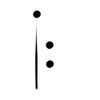Contionary:cú: Difference between revisions
Jump to navigation
Jump to search
| (26 intermediate revisions by 3 users not shown) | |||
| Line 1: | Line 1: | ||
== | ==Middle Annerish== | ||
===Etymology=== | ===Etymology=== | ||
From [[w:Proto-Germanic_language| | From [[w:Proto-Germanic_language|Germanic]] ''[[:wikt:Reconstruction:Proto-Germanic/hundaz|*hunþą, hunþō]]''; singulative borrowed from the [[w:Old_Irish|Goidelic]] ''[[:wikt:cú#Etymology_3|cognate]]''. | ||
===Pronunciation=== | ===Pronunciation=== | ||
('' | (''Annerish'') [[Guide:IPA|IPA]]: /kˠuː/ <big>[kʰuˑ]</big> | ||
* ''singulative'': /kˠuːnˠ/ [kʰũˑ(n)] | |||
{{Qrz-nn-r|g=m4|nsg=cún|npl=cóın|b2=l|nco=cú|b3=h|gsg=cón|b4=h|gpl=cún|b5=n|gco=cúd|b6=l|dsg=cóın|b7=l|dpl=cóınb|dco=cóınb|vsg=cón|vpl=cóın|vco=cú}} | |||
===Noun=== | ===Noun=== | ||
'''cú''' (''runic:''' | '''cú''' (''runic:'''ᚷᚢ''''') | ||
# | # (''{{glossary|dated}}'') Members of the species ''[[w:Dog|Canis familiaris]]''; dogs, hounds. | ||
#: ''synonym'': {{cd|cáıng}} | |||
==== | ====''ɴ.ʙ.''==== | ||
{{ | In the older language the ɴᴏᴍ. ᴄᴏʟ. was the same as the ɢᴇɴ. | ||
====See also==== | |||
* {{cd|cuan}} ("pup"); {{cd|cuaın}} ("litter") | |||
[[Category:Annerish lemmata|cu]] [[Category:Annerish nouns|cu]] | |||
==Soc'ul'== | ==Soc'ul'== | ||
{{wacag|six}} | |||
{{number box|qsc|6}} | |||
| | |||
|} | |||
===Etymology=== | ===Etymology=== | ||
{{qsc-inh|kuː|kō}} {{cog|qsc|gwax|go¹|kisl|kō}} | |||
===Pronunciation=== | ===Pronunciation=== | ||
* {{IPA all|qsc|[kʷuː˥˧]}} | |||
===Numeral=== | ===Numeral=== | ||
{{head|qsc|numeral}} | |||
# six | # six | ||
#: {{ux|qsc|Réūjiý hez'i ats ez'e yepfu uic'ad cual āhun' m'ixem '''cú''' xenuz muzr'u.|Using a string, π can be measured as approximately 19/'''6'''.}} | |||
# sixth | |||
#: {{ux|qsc||}} | |||
===Derived terms=== | |||
{{col-auto|qsc|cú xi|cú yetxam'}} | |||
===Decsendants=== | |||
*{{desc|soky|pu⁵³}} | |||
Latest revision as of 10:17, 18 February 2026
Middle Annerish
Etymology
From Germanic *hunþą, hunþō; singulative borrowed from the Goidelic cognate.
Pronunciation
(Annerish) IPA: /kˠuː/ [kʰuˑ]
- singulative: /kˠuːnˠ/ [kʰũˑ(n)]
| Ⅳ ᴍᴀsᴄ. | ɴᴏᴍ. | ɢᴇɴ. | ᴅᴀᴛ. | ᴠᴏᴄ. |
|---|---|---|---|---|
| ᴄᴏʟ. | cúʜ | cúdʟ | cóınb | cúʟ |
| sɢᴠ. | cún | cónʜ | cóınʟ | cónʟ |
| ᴘʟᴠ. | cóınʟ | cúnɴ | cóınb | cóınʟ |
Noun
cú (runic:ᚷᚢ)
- (dated) Members of the species Canis familiaris; dogs, hounds.
- synonym: cáıng
ɴ.ʙ.
In the older language the ɴᴏᴍ. ᴄᴏʟ. was the same as the ɢᴇɴ.
See also
Soc'ul'
| Wacag logograph |
|---|
 |
| 60 | ||
| ← 5 | 6 | 7 → |
|---|---|---|
| Cardinal: cú | ||
Etymology
From Sekhulla kuː, from Wascotl *kō. Cognate to Gwaxol go¹, Kilīmos-sāîl kō.
Pronunciation
Numeral
cú
- six
- Réūjiý hez'i ats ez'e yepfu uic'ad cual āhun' m'ixem cú xenuz muzr'u.
- Using a string, π can be measured as approximately 19/6.
- sixth
- (please add the primary text of this usage example)
- (please add an English translation of this usage example)
Derived terms
Decsendants
- Sokya: pu⁵³